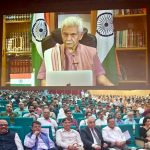The rising demand for statehood in Jammu and Kashmir, particularly by Kashmir-centric political parties, is being paraded as a fight for people’s rights. In reality, it is a battle for the return of unaccountable political power. Behind the noise of “restoring democracy” lies the anxiety of an elite class that has thrived for decades on patronage, corruption, and unchecked authority.
For ordinary citizens, statehood is not an urgent concern. Many, in fact, express satisfaction with the current arrangement where politicians and officials operate under tighter scrutiny. For them, this is the first real taste of governance free from the stranglehold of entrenched dynasties. It is a relief from a past defined by nepotism, brazen misuse of power, and systematic loot of public wealth.
A Record Written in Corruption
The history of J&K’s statehood, shielded by Article 370 and 35A, is littered with scandals. Corruption was institutionalized, backdoor appointments rampant, and nepotism a way of life. Transparency and accountability were alien concepts.
This was not just the accusation of political rivals but an open secret faced by common people and acknowledged by all. Mehbooba Mufti once accused the Congress of being “a partner in loot, bloodshed and corruption” during Omar Abdullah’s tenure (2008–2014). Omar Abdullah responded by branding the PDP a “castle for corruption.” These mutual barbs revealed not principled politics but a shared guilt.
Outside observers confirmed it too. Scholar Sumantra Bose described governance in J&K as “rampant corruption, with officials looting the exchequer at will.” Former Governor Jagmohan recorded how political elites diverted central funds and even foreign aid for personal gain.
Scams that Defined Statehood: The record speaks for itself
- Roshni Land Scam: Transfer of over 20 lakh kanals of state land worth Rs 25,000 crore to politicians, businessmen, and bureaucrats. A scheme designed to benefit the poor became a mechanism to enrich the powerful.
- Fake Arms Licence Racket: More than 4.29 lakh fraudulent licences issued across six states, with J&K officials repeatedly stalling investigation, even claiming records were “washed away” in floods.
- Backdoor Appointments: Over 2.5 lakh government jobs allegedly handed out illegally through political connections, as admitted by a former Chief Secretary. Backdoor appointees included not only pro- secessionists and terror sympathisers but active terrorists also. Several of them have already been dismissed from their jobs
- J&K Bank Corruption: Since 2019, 22 cases of graft have been filed against its officials, with several investigations now handled by the CBI. No surprises as The Bank has gone from a Rs 1139 crore loss in 2019-20 to Rs 1700 crore profit in 2023-24.
These are not stray incidents but the defining features of the system that statehood enabled.
The Real Motive behind Statehood Rhetoric
Given this record, the present clamour for statehood raises a fundamental question: is it truly about addressing people’s problems, or about regaining control over levers of patronage? If political parties believe the current setup is failing citizens, why do they not cite specific cases of public issues neglected because of the existing mechanism? Instead, their complaint is invariably about lack of “control” over police and bureaucracy.
This obsession with control exposes the real intent. For decades, “control” meant manipulation of administration, intimidation of rivals, and the looting of resources. That is the system many now wish to resurrect. Chief Minister Omar Abdullah, for example, announced in the Legislative Assembly in March 2025, his intent to re-introduce the controversial J&K State Land (Vesting of Ownership to the Occupants) Act, 2001, commonly known as the Roshni Act, in a new form.
A Shift in Public Mood
Unlike political elites, citizens appear less nostalgic. For many, the post-2019 arrangement has delivered something novel: accountability. For the first time, corruption cases are not automatically buried. For the first time, politicians cannot brazenly bypass scrutiny. While the system is far from perfect, it is viewed as a step towards genuine governance.
If anything, the popular demand is likely to evolve in the opposite direction—not for a return to the old ways, but for permanent institutionalization of an accountable governance model, strengthened by reforms.
The Way Forward
J&K does not need a return to the failed politics of dynasty and patronage. What it needs is an honest conversation on how to strengthen transparency, empower grassroots institutions, and deliver public services effectively.
If statehood is to be restored, it must be in a reimagined form—one that dismantles the entrenched ecosystem of corruption rather than revives it. Until then, calls for statehood ring hollow. They are not about the people. They are about power—unaccountable, unchecked, and undeserved.
(GL Raina is a former Member of the Legislative Council of erstwhile state of Jammu Kashmir and spokesperson of BJP JK-UT)









